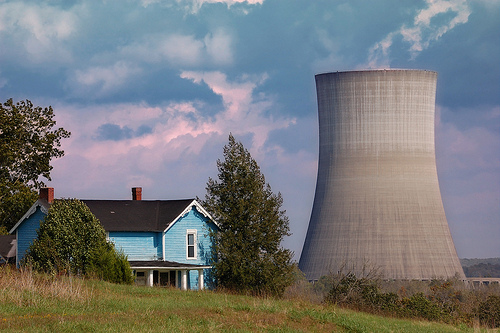The conservative German government has issued a 14-page document [PDF] outlining how Germany can close all of its nuclear reactors by 2017 — sooner than the government’s official proposal of 2022 — and still keep the lights on.
The report, and the timing of its release, indicates the intense political debate within and without the ruling coalition of Angela Merkel’s Christian Democrats and her junior partner the neoliberal Free Democrats. As noted by Craig Morris for Renewables International, the report was issued by an agency within the German Ministry of the Environment, but it was not “commissioned” by the ministry itself. This subtlety would be lost on all but the most avid political junkies.
The ministry is led by the up-and-coming conservative party member Norbert Röttgen, who distanced himself from the report but did not prevent its publication. The report will surely be used by the opposition parties in arguing that the exit from nuclear can be quicker than the Merkel government is proposing.
Ironically, the conservative Merkel government has proposed essentially the exit policy planned by the previous red-green government of Social Democrats and the Greens. Merkel’s conservative party rose to power in part on a platform of extending the operation of the existing reactors. Her policy reversal is historic not only in Germany, but worldwide.
Critics of the reversal have charged that:
- Germany will suffer power outages;
- Germany will import nuclear power from other countries, notably France; and
- Germany will build massive new coal plants to make up the shortfall.
The analysis by the German environment agency specifically examined these issues. It concluded that Germany can close the reactors within five years and do so:
- without power outages;
- without importing nuclear power from other countries;
- without building new coal plants; and
- with only a modest increase in the cost of electricity.
The agency says that Germany can close the nuclear plants by faster development of its renewable sources of energy and the construction of 5,000 megawatts of new natural-gas-fired generation. The new gas-fired generation will give the grid the needed flexibility in meeting demand while also preserving Germany’s commitment to reducing its carbon dioxide emissions.
To the surprise of many critics of Germany’s renewable energy program, the country is not a net importer of electricity. In recent years, Germany has been a net exporter of generation.
The study found that electricity imports to Germany are based on price and not on any shortage of supply and that this will continue as the reactors are taken off-line. That is, Germany buys electricity on the liberalized market when it is cheaper than generating the electricity from its own fossil-fired power plants.
The German Environment Agency estimates that a rapid exit from nuclear will cost ratepayers only $0.009 to $0.01 per kilowatt-hour. This increase, it says, is less than the price swings of natural gas and coal during the past year.
Interestingly, the higher market price for electricity will reduce the cost of Germany’s renewable energy program by decreasing the differential between the market price of electricity and the average cost of feed-in tariffs for renewable energy.
For further reading, see the Heinrich Böll Foundation’s “No Nukes, No Problem?” by Arne Jungjohann and Wilson Rickerson.



